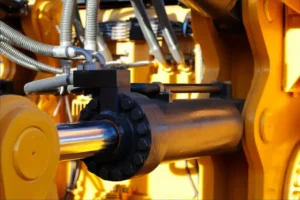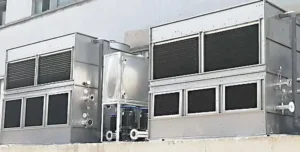In the relentless flow of modern industry, the melting and heating of metals play a pivotal role.
And behind this lies a crucial piece of equipment silently providing powerful energy, the medium frequency (MF) power supply.
It’s no exaggeration to say that the MF power supply is the “heart and soul” of the induction furnace, transforming ordinary industrial electricity into a magical force that drives the transformation of metals.
What Role Does the MF Power Supply Play
Simply put, an induction furnace is a device that uses the principle of electromagnetic induction to heat and melt metals. It mainly consists of an induction coil and an MF power supply.
When a medium-frequency alternating current (typically ranging from 300Hz to 20kHz) flows through the induction coil, it generates a strong alternating magnetic field.
The metal charge placed within this field, as if by magic, has powerful eddy currents induced within it. These eddy currents, acting against the metal’s resistance, convert into heat energy, thus achieving rapid and efficient heating and melting.
The MF power supply is precisely the wielder of this “magic.” Its core task is to “frequency convert” the industrial frequency alternating current (50Hz or 60Hz) that we use daily into a medium-frequency alternating current suitable for induction heating. This process is like an energy “translator” and “amplifier,” providing a continuous source of power for the induction furnace.
Key Applications of the MF Power Supply in Induction Furnaces
- Energy Conversion and Supply, The MF power supply, through complex circuits, converts low-frequency AC power into high-frequency AC power, providing energy to the induction coil – the foundation for achieving induction heating.
- The Core of Magnetic Field Generation, The current output by the MF power supply flows through the induction coil, generating a high-frequency alternating magnetic field. It is this magnetic field that “awakens” the eddy currents within the metal.
- Precise Power and Frequency Control, Modern MF power supplies can accurately regulate the output power and frequency, thereby controlling the heating rate, temperature, and heating depth of the metal to meet the requirements of different materials and processes. For example, higher frequencies are suitable for rapid surface heating, while lower frequencies are better for deep melting.
- Safety Assurance and Intelligent Control, Advanced MF power supplies are equipped with various protection mechanisms such as overcurrent, overvoltage, and overheating protection to ensure the safety of equipment and operators. At the same time, the application of intelligent control systems makes processes such as temperature control and power adjustment more automated and efficient.
Development Trends of MF Power Supplies
With the rapid development of power electronics technology, MF power supplies are constantly evolving.
- Higher efficiency and energy saving, Newer IGBT (Insulated Gate Bipolar Transistor) MF power supplies, with their high switching frequency and low loss characteristics, are gradually replacing traditional KGPS (Thyristor) power supplies, achieving higher energy utilization rates.
- More Intelligent and User-Friendly, The application of all-digital control technology makes the operation of MF power supplies more intelligent, enabling remote monitoring and fault diagnosis, significantly improving production efficiency and maintenance convenience.
- More environmentally friendly and stable, reducing harmonic pollution, and improving power factors are important considerations in the design of modern MF power supplies, which help protect the power grid quality and improve the operational stability of the equipment.
The application fields of induction furnaces are wide-ranging
- Metal Melting: Melting various metals such as steel, aluminum, copper, and precious metals.
- Metal Heating: Heat treatment processes such as forging, rolling, quenching, and annealing.
- Induction Billet Heating: Integral heating of metal bars, pipes, etc., to prepare for subsequent processing.
- Holding: Maintaining the temperature of molten metal to ensure casting quality.
Conclusion
The medium frequency power supply is not just a simple power conversion device, it is the core driving force behind modern industrial heating and melting technology.
With continuous technological advancements, we have reason to believe that future MF power supplies will be more efficient, intelligent, and environmentally friendly, providing more powerful and reliable energy support for metal processing in various industries and continuously promoting the progress of industrial technology.







